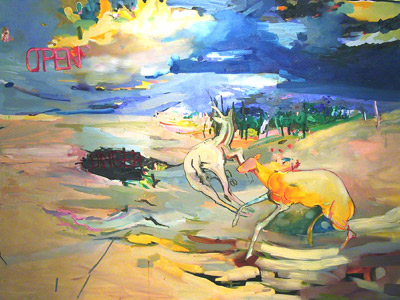View current page
...more recent posts
Paul has spotted DEVO 2.0 at Disney online. It's kids lipsynching to fairly tight, "family friendly" versions of the songs, with backing tracks re-recorded by the original band. As Paul notes, the lyrics have been changed: it's not just taking out the dirty words, but "removing or reversing their original core meaning."
I watched the "Freedom of Choice" vid and I don't think I can go on. It's well done and fun, and you can't fault DEVO for selling out--in essence, they inoculated themselves from that criticism early on by tying their concept of "Devolution" to a general decline in culture and intelligence, INCLUDING becoming commercial hacks--"We're devolving, see?"
But as an early fan of the band it's just too painful to hear the lines "Freedom of choice is what you've got/Freedom from choice is what you want" changed so that the "from" in the second line becomes a second "of." Or the lyric about the dog "who sniffs one bone, then licks the other, then spins in circles till he drops dead" changed to "he drops down."
Choice killed the dog, OK? Is that too much for a kid to grasp?
How many times can someone steal that same vase?
From the Guardian:
Saviour of Iraq's antiquities flees to SyriaFreedom is untidy.
Michael Howard in Irbil
Saturday August 26, 2006
Iraq's most prominent archaeologist has resigned and fled the country, saying the dire security situation, an acute shortage of funds, and the interference of supporters of the radical Shia cleric Moqtada al-Sadr had made his position intolerable.Donny George, who was president of the State Board of Antiquities and Heritage, achieved international recognition for his efforts to track down and recover the priceless antiquities looted from Iraq's National Museum in the mayhem that followed the fall of Baghdad in 2003.
But this week he revealed that he had resigned and was in hiding with his family in the Syrian capital Damascus. In an interview with the Art Newspaper, Dr George said Baghdad was now so dangerous that the National Museum, which houses a trove of Sumerian and Babylonian artefacts, had been sealed off by concrete walls to protect it from insurgent attacks and further looting.
The museum, established by the British in the 1920s, is situated near to Baghdad's notorious Haifa Street, an area that sees regular outbreaks of violence. It lost some 15,000 pieces during the looting in 2003, but about half of them have been recovered. Museum officials say the collections have been walled off four times since the invasion, most recently after a mass kidnapping near the museum building.
"It was the only way to guarantee the museum's safety," said Dr George, who said he had taken the decision despite opposition from the culture ministry. An indefinite delay in the reopening of the museum had been ordered by the ministry.
Dr George painted a bleak picture for the future of Iraq's ancient treasures. He said that excavation and conservation projects in Iraq had stalled and that all the foreign archaeologists had left the country.
He said the 1,400 members of the special antiquities protection force would be going without pay, meaning there would be little to stop further looting at the country's 11,000 archaeological sites. "From September there is no more money for their salaries," said Dr George. "The coalition has to do something about this."
After the looting in 2003 US officials were criticised by archaeologists for not securing the museum. The US military has since been accused of damaging a number of ancient sites. Dr George said the work of the antiquities department had also been affected by the sectarian divide in Iraq, with key posts in the culture ministry being filled with loyalists of the militant Shia cleric Moqtada al-Sadr, including Liwa Sumaysim, the minister of state for antiquities.
"The board has come under the increasing influence of al-Sadr," claimed Dr George. "I can no longer work with these people who have come in with the new ministry. They have no knowledge of archaeology, no knowledge of antiquities."
Dr George, a Christian, said he had battled to prevent an Islamist and anti-western agenda from taking over at the antiquities department. "A lot of people have been sent to our institutions. They are only interested in Islamic sites and not Iraq's earlier heritage. The Sadrists did not like me having any contact with anyone from outside," he said.
Since the war Dr George has travelled the world, highlighting the plight of his country's ancient heritage. He had forged close ties with foreign institutions, including the British Museum. Hannah Bolton, a spokeswoman for the museum, said the museum promised to continue cooperating with the Iraqi authorities, and also hoped to continue its close relationship with Dr George.
The culture ministry could not be reached for comment yesterday but a senior Sadrist, who spoke on condition of anonymity, said Dr George had served throughout the former regime and "had done nothing to stop Saddam carving his name into the walls of every brick" during the reconstruction of the ancient palace at Babylon.
Lost and found
Warka vase
The 5,000-year-old limestone vase from the Sumerian city of Uruk is carved with scenes of priests and animals. It is the oldest known carved ritual vase. It was returned, in pieces, in June 2003.
Statue of Entemena
The headless statue of the Mesopotamian king is made of black diorite and dates from 2430 BC. It was smuggled out to Syria and recovered in May, when Hicham Aboutaam, a Lebanese antiquities dealer, was offered it for sale in New York.
Sumerian free-standing
The stone statue of a male Sumerian priest bears an inscription about the goddess Nin-shu-pur and dates from 2500 BC, one of the earliest known examples.
Mask of Warka
Dating from 3100 BC, it is the oldest known sculpture of a natural human face and is nicknamed the Sumerian Mona Lisa. It was found buried at a farmhouse in al-Rabbia in 2003.
Bassetki statue
The copper sculpture, depicting the legs and lower torso of a seated male figure, bears an Akkadian inscription and is 4,300 years old. It was found in a cesspool in 2003.
Katy Heslop, www.theartnewspaper.com
I had a table (html) art piece here that I took down. It worked fine in Firefox and IE but once again Apple's Safari hates my art. A friend with that browser said that the table was too wide, forcing him to side to side scroll to read my page. That should never happen (I design this for an 800 x 600 screen), and if it does, please tell me. While I'm crying about Safari, please take a look at this blog from the jodi.org blogroll.
"Hiphop Snares" [mp3 removed]
An extended drum solo, with lots of filtering and EQ.
Update: added a couple of keyboard parts at the two "crescendos."

"Bay Crossing" - a film about crossing the San Francisco bay in a homemade rowboat, by Steve MacDonald. The voiceover consists of droll recordings of MacDonald calling around to various public safety officials trying to figure out what permits he needs and "how safe it is." [YouTube] |

Chris Ashley has been posting scans of old children's book covers amid his regular weblog entries. More intriguing design ideas than you can shake a frisket at. The hand-rendered photographic style of A Pony for Linda, above, resembles the high contrast still images of the Cartoon Network show Tom Goes to the Mayor. What doesn't work in an animated cartoon looks great on a kid's book. Also in Ashley's compendium, be sure to check out the endearingly Henry Darger-ish What's Inside of Me?
The image below just hit my email inbox, from Marvelli Gallery in Chelsea. Haven't seen the work in person and know nothing about the artist, but this jpeg, at least, strikes a good bad painting chord. Paging through other work we see a distinct Dana Schutz vibe, but also Judith Linhares with a bit lighter touch, or Laura Owens, if the latter had an ounce of finesse as a painter. Anyway, I'm getting my virtual tasty brushstroke (and nature panic) fixes for the day: Janine Iversen, "Open Longer," 2006, Oil on Canvas, 60 X 78 inches |
Two posts from libertarian blogger Jim Henley crack me up. First, about the Iranian surprise attacks the scaremongers were predicting for August 22, he writes:
And earlier, about ex-CIA analyst Kenneth Pollack, author of the unfortunately influential 2002 book The Threatening Storm: The Case for Invading Iraq:As you know, today was the day that, as predicted by respected Muslim World Experts TM, the apocalyptic regime of Iranian terror masters attacked the West in the name of hastening the coming of the Twelfth Imam. I experienced the carnage first-hand. This morning on the Washington Beltway a guy drove really slow in the left lane - right in front of me. Couldn’t have been going over 50.
I was as resolute in refusing to be cowed by this unprovoked Iranian aggression as I was enraged at the fecklessness of our leaders, who failed to preempt the outrage by launching a major and of course purely defensive war on the Islamic Republic.
But where the craven Bush Administration and its puppeteers on the decadent Left fail America, the blogosphere can fill the void. We are fighting this war too, no less than the meeting planners at the think tanks and the guests on talk shows and the dumpers of fluids into airport bins. So I’m offering this blog item as a sharing - and yes, healing - place. Each of you, please tell us how you coped with the Day of Dodecahedral Doom. Whether acolytes of the Twelfth Imam cut in front of you at Au Bon Pain or put you on hold without asking or failed to note that your blog linked something before any other blogs you happened to notice, no enormity is too, well, enormous, for us to bear, together.
Great stuff.Kenneth Fucking Pollack writes to tell us that civil war in Iraq is a very bad thing. Honest to god, this kind of thing is all the explanation this blog’s frequent resort to profanity requires. Ken baby, it’s your civil war as much as anyone’s. Pollack did more than anyone to encourage the famous “liberal hawks” to provide the bipartisan patina so useful in getting the Iraq invasion started. In the Army, someone would have long since left him alone in the study with a pistol and the discreet interval required to make the only appropriate gesture of regret, genuine atonement being impossible under the circumstances. In Japan he’d be a picture of the different ways light reflects off entrails and cutlery. In Washington, he gets to write new articles, as if he were an epidemiologist and not Typhoid Mary.
